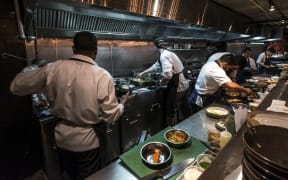A hospitality worker says there is no skilled labour shortage, it's just that the hospitality industry isn't paying workers enough.

File photo. Photo: 123rf
Hospitality businesses across the country are closing their doors or shortening their opening hours as they struggle to find the staff they need to keep operating.
Restaurant and cafe owners say there just aren't enough New Zealanders to fill the jobs.
The industry is calling for urgent visa extensions, border exemptions for critical workers, and extended working hours for student visas.
Chloe Ann-King, who has worked in hospitality for 16 years and runs hospitality union Raise the Bar, disputes there aren't enough New Zealanders to fill the record number of vacancies. She said the problem is not a labour shortage but a wage shortage.
"I have not worked for one hospitality employer that even had a basic understanding of our employment laws, and now that I've been advocating in it for about three to four years, every single day I am contacted by hospitality with workers that are being paid less than minimum wage.
"They're enduring sexual harassment, bullying on shift. We are subjected to such unsafe working conditions.
"What needs to happen is some really huge transformational change in our industry to attract workers like me, many of my hospitality friends and all the workers that contact Raise the Bar every single day."
Ann-King has worked front of house, behind the bar, in the kitchen and on the restaurant floor.
But even with that experience, she said when she had applied for jobs, the most she had ever been offered was around $21 an hour.
"They're tired of being offered minimum wage or slightly above or even $25 is adding insult to injury when you have spent 10-20 years crafting your skill set, learning how to make barista level coffee, how to make amazing cocktails. Everything else that goes into working the industry, all the emotional labour.
"Our jobs are highly skilled and to be offered such low pay it's an absolute insult. If employers want to see us coming back into the industry, they're going to have to offer higher wages. They're going to have to offer us working conditions that don't leave us burnt out and feeling like we're subhuman."
She said many job advertisements on websites like Seek and TradeMe call for a high level of skill and experience, yet the pay is on par with that of an entry-level worker.
"They want someone that can make baristas standard coffee - that takes years to learn. Learning how to stretch the milk properly, the perfect pour, making hundreds of coffees a day in high volume environments. Not everyone can do that.
"Making high volume cocktails is not for everyone, and they're looking for incredibly skilled people that can go from the floor to the bar, maybe go help out in the kitchen, jump back onto the bar, do full table service. All of those things take immense skill and it takes years to learn to do it without fault and without making mistakes."
But Hospitality NZ national president Jeremy Smith said that was not true.
He said if people had the training and experience they will be paid at a higher rate. If not, they would be paid what the owners could afford.
"If I paid everybody in my business $30 [an hour] plus, then I might as well shut the doors, it's not viable.
"Part of the aim of running a business and employing people is the ability to pay them and look after them long term. And I'm an employee as well. I work in the business and need to be able to pay it myself, otherwise why would you go through all the stress and the risk.
"We're looking for senior bar staff and what they're being paid and what they can demand is significantly higher than it was a couple of years ago, but we're not getting responses even at higher rates. The people aren't out there because we don't have those skilled people in New Zealand, those jobs were filled by travellers and visa people."
He said there were simply not enough Kiwis to fill the jobs.
"We have, for a number of years, relied on a combination of Kiwis and part time workers and students, but also, you know, being a seasonal business, we rely very heavily on people coming into the country to pick up a number of the jobs that we need filled. So, at the moment, we don't have enough New Zealanders coming into the industry and we don't have our regular travellers and we're not renewing visa, so it's a perfect storm."
Ann-King said hospitality workers should know their worth.
"They have massive bargaining room at the moment. Supply and demand, right? So we've got a critical labour shortage if they're being offered minimum wage … ask for $25 ask for $27, ask for $30."
Trade Me figures recently released showed a 56 percent increase in hospitality and tourism job listings this year compared to 2019.
Minister of Finance Grant Robertson told First Up that paying the living wage would help businesses retain staff.
"We would certainly encourage people to offer wages that are around that living wage level that will be attractive to people.
"Clearly there may well still be shortages on top of that that's where the immigration side of things but absolutely we want to see wages in the hospitality industry increase just as we do elsewhere," he said.
Robertson said the government had extended thousands of working holiday visas that were due to expire between 21 June and the 31 December for a further six months.
"Obviously we've got limited spaces and we're trying to fill critical skill gaps but we are making it easier for those who are already here to stay and we will continue to work around where the pay rates are in terms of those critical skill work categories and how hospitality can be a part of it."
He said the government will consider a range of options if skill shortage issues remained after the six-month extension to working holiday visas.
"There are skill shortages all across the economy, that's because the New Zealand economy recovered far better than had been expected, we're managing our way through that while balancing that against the need to keep New Zealanders safe and the limited amount of MIQ space we have.
"We're not just stopping where we are now, we're looking closely at how we can support businesses right across the board and how the different visa arrangements support that. It's a balancing act - it's challenging but we will continue to work with the sector on that."




